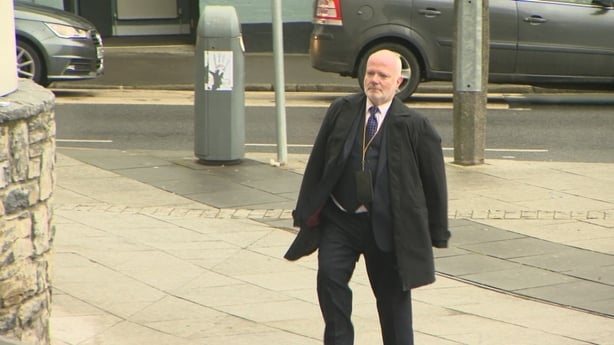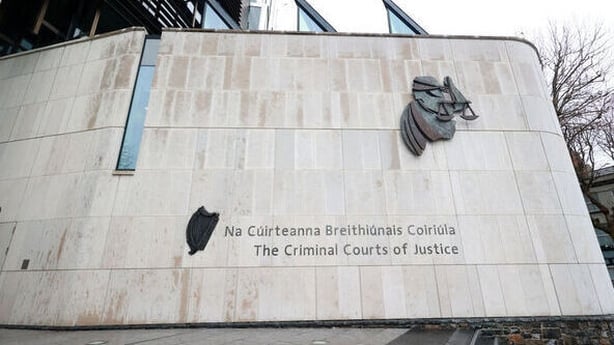The life of former judge Gerard O'Brien was one lived in adversity, his defence counsel told the court.
Yet, for many years, he was hugely respected by those who dealt with him.
He was admired for the way he seemed to have overcome being born with no arms and only one leg, to become a teacher, a solicitor and finally a Circuit Court judge.
On the announcement of his nomination to the court in 2014, a local news website in his hometown of Thurles, Co Tipperary described him as a role model for "adults and their offspring".
Senior Counsel Michael O’Higgins told the Central Criminal Court earlier this year, that his client had managed to "conquer Mount Everest on the career front", despite setting out on a career path that must have seemed "totally unrealistic for someone with his disabilities".
But behind the successful professional façade the court heard O’Brien was "very immature", "psychologically vulnerable", prone to negative thinking, anxiety and major depressive episodes.
The even darker secret he was hiding, was his abuse of schoolboys who had admired him and the devastating effects his involvement with them had on their lives.
O’Brien was born in 1964. Mr O’Higgins described him as a "thalidomide baby".
Thalidomide, marketed for morning sickness in almost 50 countries under a variety of names, is believed to have affected thousands of babies worldwide.
It was withdrawn internationally in 1961 after it was found to cause major birth defects.
It was not removed from the Irish market until 1962.
In a radio documentary about O’Brien, broadcast on RTÉ in 1992, his mother spoke about being very sick at the very beginning of her pregnancy.
She said the doctor was giving her injections but she didn’t know she was pregnant at the time and didn’t know what she had taken.
She said she had thalidomide in the house – as there were no sell by dates on the drugs at that stage.
But she said she couldn’t prove that she had taken it.
O’Brien’s sentencing hearing was told that this "doubt" about the cause of his condition meant he did not receive the compensation that other affected families eventually received and had to provide for himself.
O’Brien’s father died when he was nine years old.

The court was told this was not spoken about at home and O’Brien’s disabilities were also "not talked about".
Mr O’Higgins said he was determined not to let his "profound physical disabilities" stop him "having joy in daily life" and he learned to use his foot and his mouth.
O’Brien was academically bright and studied law at UCD. However, he found it difficult to get a start as a solicitor.
He told the trial that he would see the "shutters go down" in people’s eyes when they saw he was disabled.
He was offered the opportunity to retrain as a secondary school teacher at the Christian Brothers secondary school in Monkstown in south county Dublin.
He quickly gained the respect of staff and students for his ability to overcome his very significant physical challenges.
In the RTÉ radio documentary, the then principal of the school paid tribute to O’Brien and described "the enormous amount of extra work" involved for O'Brien in doing the ordinary things in life such as going to the toilet, dressing and undressing.
O’Brien himself spoke of his frustrations that he could not do these things independently.
But he said he couldn’t have it seen "as something embarrassing" because he had to go to the toilet.
Students were expected to help him. He told the documentary that in one class he had, there were six students in the front row who had brought him to the toilet and had no problem with it.
"They didn’t give a damn and that was that," he said.
Students who spoke in the programme said they never thought about him being disabled.
One said: "If you know him and like him, it’s like just doing a thing for a friend".
Decades after that documentary was first broadcast, the victim impact statements of O’Brien’s victims, cast his behaviour in CBC Monkstown in a much darker light.
Four of the six boys and young men in this case were students or former students at the school.
Many of the boys had similar stories. They would become friends with O’Brien, often through his work on the school musical.
They would socialise with him in pubs and would help him with tasks like going to the toilet.
They would stay the night with O’Brien, intending to help him with the personal care tasks he was not able to perform independently.
Often this would involve sleeping in the same bed as O’Brien.
Five of the six victims described being woken from their sleep to find O’Brien performing a sexual act on them, to which they had not consented.
The assault on the sixth young man took place in a pub toilet.
The trial heard evidence of "lax regulations" and a "drinking culture" surrounding the school at the time.
One of O’Brien’s victims, who was a student at the school, gave evidence of being at a staff party with O’Brien and a woman who was working as a choreographer.
They all went back to O’Brien’s house where the boy ended up having sex with the choreographer while O’Brien was in the room.
On another occasion, some time later, the same boy was again staying in O’Brien’s home and woke to find O’Brien sexually assaulting him.
This boy later told the court how his mental and physical health had suffered as a result of his involvement with O’Brien.
He had "lost so much time" he said and believed he would have been a very different person if he had never met O’Brien.
Judge Owens said O’Brien had led this boy astray and put him in an adult situation beyond his experience.
He said the offending was not spur of the moment but had been thought about in advance.
The assaults ended in 1997 when another boy who was staying overnight with O’Brien reported O’Brien’s actions to his mother, who told the then-principal.
O’Brien left the school and the court heard he sought treatment in St John of God’s and at the now closed Granada Institute which provided treatment to child sex abusers.
Unable to teach, O’Brien returned to his legal career.
He trained with law firm Garrett Sheehan and Company and later worked with firms Roger Greene & Sons and BCM Hanby Wallace (now Byrne Wallace).
In 2006, he set up his own practice in Thurles.
He also ran successfully for a seat on Thurles Urban District Council for Fianna Fáil in 2009.
Three years later he became state solicitor for North Tipperary and in 2015 he was appointed as a circuit court judge.
He set up a musical theatre group in Thurles.
Later he told his trial that musical activities provided a "safe" place for him.
"It doesn’t matter if I have no arms, he said, "I have a good voice. I’m on equal foot with everybody".
The 1992 documentary hinted at the loneliness that lay beneath his achievements.
He spoke about the fact that the "bachelor pad" he lived in, lacked the companionship he would like and that he strived for.
He told the documentary makers that "the bottom line" of where he would like to go was "to be married or in a permanent relationship".
Later he realised he was gay, but Michael O’Higgins told the court that O’Brien’s attempts to have consensual relationships all ended very badly and he had never had anything "approximating to an ordinary one-on-one stable relationship" with anyone.
Mr O’Higgins submitted that O’Brien’s "unmet sexual needs" due to being gay in a homophobic society, as well as his severe disabilities and the culture of excessive drinking in the school led to him blurring the boundaries with students.
He also pointed out that O’Brien had been sexually assaulted himself as a child.
Mr O’Higgins said the convictions now meant that O’Brien had lost everything.
He "scaled very lofty heights", Mr O’Higgins said, but had now come "crashing down".
Judge Alex Owens had little sympathy for these submissions in his sentencing remarks.

There was no reason any pupil should have been put in the position of sharing a bed with O’Brien he said.
He said O’Brien did not reflect on the harmful consequences of his actions on his victims but acted on impulse and was on the lookout for opportunities to pounce on them.
Judge Owens said O’Brien used his position as a teacher to win his pupils' trust, inveigling his way into being close to them at night and manipulating things to give him the opportunity to engage in the sexual activity he wanted.
The judge said the lack of regulations in the school and O’Brien’s sexual difficulties did not reduce his culpability.
He also spoke about the adverse effects on O’Brien’s victims.
All six were "caught off guard" the judge said, but blamed themselves for putting themselves in a position where they were abused.
All of them felt they should have been able to stop him.
But the judge said O’Brien engaged in a "well established pattern of predatory behaviour" interfering with his victims’ education, mental health and future relationships.
The judge pointed out that the maximum sentence for the sexual assault offences at the time, was five years.
In a lengthy, carefully thought out ruling, he imposed a total sentence of five years and nine months, suspending 21 months to take mitigating factors, mainly O'Brien's lack of any other offending, into account.
The sentence includes two consecutive prison terms and means that O’Brien has an effective jail term of four years.
Sentencing had been delayed for a month after the judge asked for information from the prison service about the facilities that could be put in place for O’Brien to deal with his disabilities.
He received a letter from the Prison Service and Enda Kelly, National Operational Nurse Manager with the service, was present in court.
O’Brien will serve his sentence in a unit with facilities for prisoners with disabilities.
Outside court, Detective Chief Superintendent Colm Noonan of the Garda National Protective Services Bureau, paid tribute to the "extraordinary bravery and the courage" of the victims in this case.
He said they had inspired others and he hoped they would be able to move forward.
He said the case sent a clear message, that "no one is above the law".
The board of management of CBC Monkstown also commended the bravery of the men.
In a statement published on the school’s website, it described the evidence that emerged in the case as "truly shocking".
It said it was a source of deep sorrow and regret that O’Brien had abused young pupils while a member of the teaching staff.
The board said they implemented "robust safeguarding procedures" in all their school settings.
And it said the school authorities had put specialised counselling services in place, available to victims and survivors at no cost and with minimum waiting times.
The men who were assaulted are now in their forties and early fifties.
But the effects of what happened to them as teenagers and very young men continue.
One man told the court he would never fully recover from the mental damage. He said he would still be attending therapy, even when Gerard O'Brien had finished serving his sentence.






